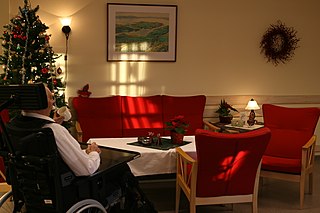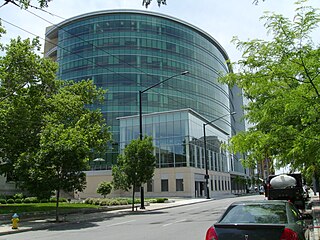Related Research Articles

In the United States, Medicaid is a government program that provides health insurance for adults and children with limited income and resources. The program is partially funded and primarily managed by state governments, which also have wide latitude in determining eligibility and benefits, but the federal government sets baseline standards for state Medicaid programs and provides a significant portion of their funding.

The Centers for Medicare & Medicaid Services (CMS) is a federal agency within the United States Department of Health and Human Services (HHS) that administers the Medicare program and works in partnership with state governments to administer Medicaid, the Children's Health Insurance Program (CHIP), and health insurance portability standards. In addition to these programs, CMS has other responsibilities, including the administrative simplification standards from the Health Insurance Portability and Accountability Act of 1996 (HIPAA), quality standards in long-term care facilities through its survey and certification process, clinical laboratory quality standards under the Clinical Laboratory Improvement Amendments, and oversight of HealthCare.gov. CMS was previously known as the Health Care Financing Administration (HCFA) until 2001.
A nursing home is a facility for the residential care of older people, senior citizens, or disabled people. Nursing homes may also be referred to as care homes, skilled nursing facilities (SNF) or long-term care facilities. Often, these terms have slightly different meanings to indicate whether the institutions are public or private, and whether they provide mostly assisted living, or nursing care and emergency medical care. Nursing homes are used by people who do not need to be in a hospital, but require care that is hard to provide in a home setting. The nursing home staff attends to the patients' medical and other needs. Most nursing homes have nursing aides and skilled nurses on hand 24 hours a day.

An assisted living residence or assisted living facility (ALF) is a housing facility for people with disabilities or for adults who cannot or who choose not to live independently. The term is popular in the United States. Still, the setting is similar to a retirement home, in the sense that facilities provide a group living environment and typically cater to an older adult population. There is also Caribbean assisted living, which offers a similar service in a resort-like environment.

Long-term care (LTC) is a variety of services which help meet both the medical and non-medical needs of people with a chronic illness or disability who cannot care for themselves for long periods. Long-term care is focused on individualized and coordinated services that promote independence, maximize patients' quality of life, and meet patients' needs over a period of time.
The California Medical Assistance Program is the California implementation of the federal Medicaid program serving low-income individuals, including families, seniors, persons with disabilities, children in foster care, pregnant women, and childless adults with incomes below 138% of federal poverty level. Benefits include ambulatory patient services, emergency services, hospitalization, maternity and newborn care, mental health and substance use disorder treatment, dental (Denti-Cal), vision, and long-term care and support. Medi-Cal was created in 1965 by the California Medical Assistance Program a few months after the national legislation was passed. Approximately 15.28 million people were enrolled in Medi-Cal as of September 2022, or about 40% of California's population; in most counties, more than half of eligible residents were enrolled as of 2020.
WellCare Health Plans, Inc. is an American health insurance company that provides managed care services primarily through Medicaid, Medicare Advantage and Medicare Prescription Drug plans for members across the United States.
Centene Corporation is a publicly traded managed care company based in St. Louis, Missouri, which is an intermediary for government-sponsored and privately insured healthcare programs. Centene ranked No. 25 on the 2023 Fortune 500.
Healthcare reform in the United States has a long history. Reforms have often been proposed but have rarely been accomplished. In 2010, landmark reform was passed through two federal statutes: the Patient Protection and Affordable Care Act (PPACA), signed March 23, 2010, and the Health Care and Education Reconciliation Act of 2010, which amended the PPACA and became law on March 30, 2010.
Amerigroup is an American health insurance and managed health care provider. Amerigroup covers 7.7 million seniors, people with disabilities, low-income families and other state and federally sponsored beneficiaries, and federal employees in 26 states, making it the nation's largest provider of health care for public programs. In July 2023, it was announced that Amerigroup's name would change to Wellpoint in six states beginning in January 2024.

The United States spends approximately $2.3 trillion on federal and state social programs including cash assistance, health insurance, food assistance, housing subsidies, energy and utilities subsidies, and education and childcare assistance. Similar benefits are sometimes provided by the private sector either through policy mandates or on a voluntary basis. Employer-sponsored health insurance is an example of this.

CareSource is a nonprofit that began as a managed health care plan serving Medicaid members in Ohio. Today, it provides public health care programs including Medicaid, Medicare, and Marketplace. The company is headquartered in Dayton, Ohio. It is the largest Medicaid plan in Ohio and is second largest in the United States.
In the United States, health insurance marketplaces, also called health exchanges, are organizations in each state through which people can purchase health insurance. People can purchase health insurance that complies with the Patient Protection and Affordable Care Act at ACA health exchanges, where they can choose from a range of government-regulated and standardized health care plans offered by the insurers participating in the exchange.

The Affordable Care Act (ACA), formally known as the Patient Protection and Affordable Care Act (PPACA) and colloquially as Obamacare, is a landmark U.S. federal statute enacted by the 111th United States Congress and signed into law by President Barack Obama on March 23, 2010. Together with the Health Care and Education Reconciliation Act of 2010 amendment, it represents the U.S. healthcare system's most significant regulatory overhaul and expansion of coverage since the enactment of Medicare and Medicaid in 1965.
Molina Healthcare, Inc. is a managed care company headquartered in Long Beach, California, United States. The company provides health insurance to individuals through government programs such as Medicaid and Medicare.

Small Smiles Dental Centers was a privately-owned US chain of dental clinics focused on serving children from low-income families. The parent company, Church Street Health Management (CSHM), has its headquarters in Suite 520 of the Castner-Knott Building in Nashville, Tennessee. As of 2010, Church Street was the largest dental management company in the United States, and for a period it was the largest dental chain for children in the United States. As of March 2014, Small Smiles had 53 offices, and it stated that it served hundreds of thousands of children annually. As of September 2021, Small Smiles appeared to have one location in Reno, Nevada.

Marilyn Barbour Tavenner is an American government official and health-care executive who served as the Administrator of the Centers for Medicare and Medicaid Services, an agency of the United States Department of Health and Human Services, from 2011 to 2015.
Patient navigators educate and assist United States citizens in enrolling into health benefit plans stipulated in the Patient Protection and Affordable Care Act (ACA). Patient navigators are also called "insurance navigators" or "in-person assisters" who have defined roles under the ACA. Although their roles might overlap, patient navigators are not community health workers or health advocates. "Navigators" work in states with Federally-Facilitated Exchanges (FFEs) or State Partnership Exchanges.
As of 2017, approximately 1.4 million Americans live in a nursing home, two-thirds of whom rely on Medicaid to pay for their care. Residential nursing facilities receive Medicaid federal funding and approvals through a state health department. These facilities may be overseen by various types of state agency.

In the context of public healthcare policy of the United States, the Medicaid coverage gap refers to uninsured people who do not qualify for marketplace assistance under the Affordable Care Act (ACA) and reside in states that have not adopted Medicaid expansion under the ACA. People within this categorization have incomes above the eligibility limits for Medicaid set by their state of residence but fall below the federal poverty line (FPL), resulting in deficient access to affordable health insurance. As of March 2023, an estimated 1.9 million Americans in 10 states are within the Medicaid coverage gap according to the Kaiser Family Foundation. Approximately 97 percent of this cohort lives in the Southern U.S., with a majority living in Texas and Florida; Texas has the largest population of people in the cohort, accounting for 41 percent of people in the coverage gap.
References
- ↑ "Lily Sarafan: Home Care Assistance's Top 10 Achievements of 2012". huffingtonpost.com. 2 January 2013. Retrieved 17 May 2014.
- ↑ "Lifestyle and Alzheimer's Prevention webinar info |[.. not just] Another Baby Boomer Blog". anotherbabyboomer.com. Archived from the original on 4 February 2013. Retrieved 17 May 2014.